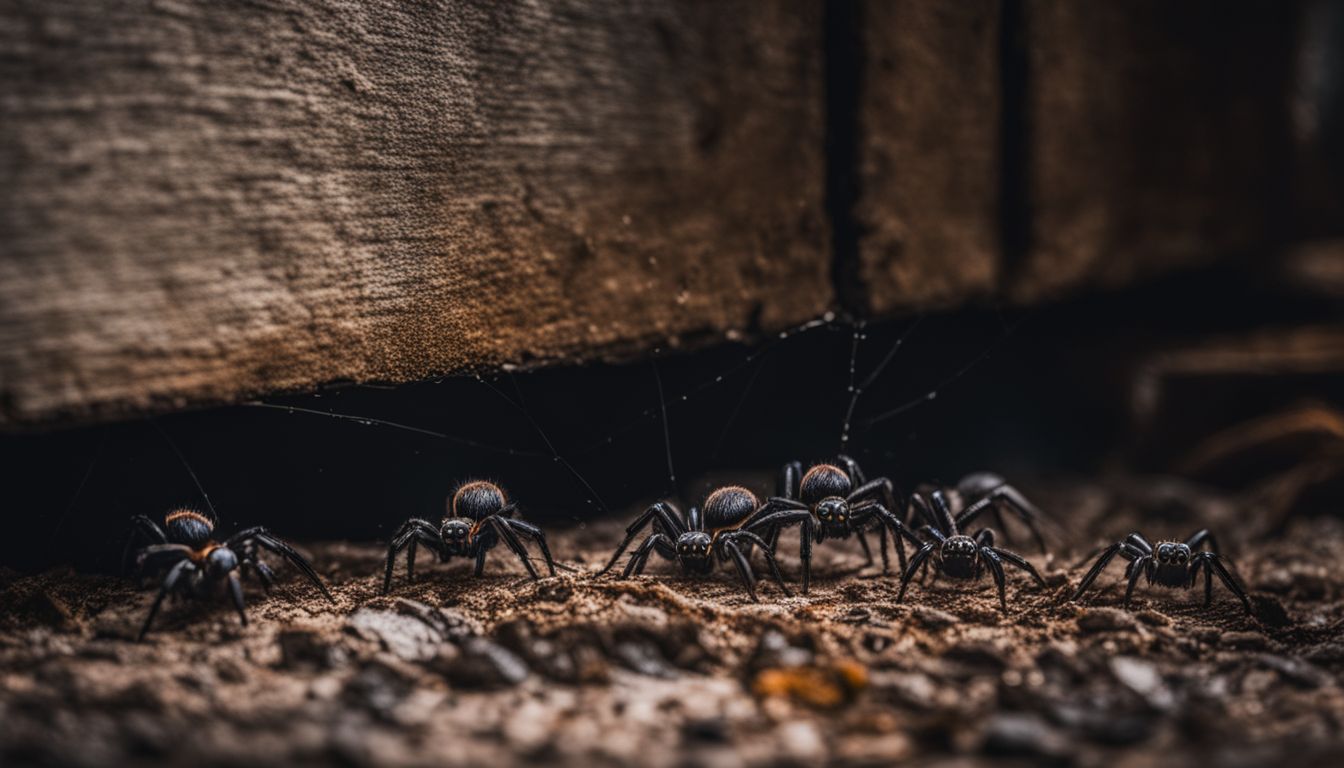Spiders might be turning your basement into their home, and you want them out. Vinegar sprays can keep these eight-legged guests away. In this post, we’ll cover easy steps to spider-proof your basement using simple methods and handy tips.
Keep reading to make your basement spider-free!
Key Takeaways
- Use natural remedies like vinegar sprays and essential oils that spiders dislike to repel spiders from your basement.
- Sealing cracks, decluttering, reducing hiding spots, and making proper lighting and landscaping adjustments are effective physical measures to prevent spiders from entering your basement.
- Consider the role of natural predators like frogs in controlling spider populations around your home. Encouraging frog-friendly environments can help naturally reduce the presence of spiders.
- Combine these strategies for a comprehensive approach to create an inhospitable environment for spiders in your basement.
Understanding Spider Attraction to Basements

Spiders are attracted to basements due to the dampness and darkness, which provides an ideal environment for them. They also enter through common entry points such as cracks and gaps in walls, windows, and doors.
The Role of Dampness and Darkness
Basements often have damp air and not much light. This makes them perfect for spiders looking for a cozy home. Moist places give spiders the water they need, and darkness lets them hide easily.
Cracks in walls or floors let these bugs sneak in and start living where it’s wet and dim.
After knowing why basements attract spiders, it’s good to check how they get inside. Let’s look at the common ways these eight-legged visitors find their way into your space.
Common Entry Points for Spiders
Spiders sneak into basements through small openings. These spots give them easy access to your cozy, dark basement. Here’s how they get in:
- Cracks and Gaps: Look at the walls of your basement. You might find cracks and gaps where spiders can crawl through. Sealing these with caulk stops them from getting in.
- Doors: The bottom of your basement door might have a gap underneath it. This is like a welcome mat for spiders. Fixing a door sweep to the bottom blocks their path.
- Windows: Basement windows that don’t close tight are another way spiders come inside. Make sure windows shut all the way and repair any broken ones.
- Vents: Air vents help your basement breathe, but spiders use them as doors too. Cover vents with fine mesh screens to keep the crawlers out but let air flow freely.
- Utility Openings: Pipes and wires that go into your basement have holes around them. Fill these spaces with steel wool or caulk so spiders can’t squeeze through.
Natural Remedies and Repellents

Discover natural and effective ways to keep spiders out of your basement, including using vinegar, essential oils that spiders dislike, and diatomaceous earth. These remedies are safe for the environment and can help prevent spider infestations in your home.
https://www.youtube.com/watch?v=wV3xLIpWlQo
Vinegar as a Spider Deterrent
Vinegar is a strong spider repellent. It works well to keep spiders out of your basement. Mix equal parts water and vinegar in a spray bottle for an easy pest control solution. Spray this mixture around doors, windows, and any cracks where spiders might sneak into your basement.
Spiders hate the smell and taste of vinegar. If they touch it, the acid can hurt them. This makes vinegar great for fighting off black widows and other scary spiders. Reapply this mix often to make sure spiders stay away from your home.
Keep your basement spider-free with regular sprays in all the dark corners where they like to hide.
Essential Oils That Spiders Dislike
After learning about using vinegar as a spider deterrent, another effective natural method is using essential oils that spiders dislike. Essential oils such as peppermint, eucalyptus, citronella, cedarwood, tea tree, and lavender are known to repel spiders. These oils affect a spider’s sensory receptors and respiratory system. Peppermint oil has been particularly effective in keeping spiders away from homes due to its strong scent that disrupts a spider’s ability to smell and breathe properly. Furthermore, eucalyptus oil damages a spider’s respiratory system, making it an excellent repellent. However, the effectiveness of certain essential oils like peppermint oil in repelling spiders is still under debate.
Using Diatomaceous Earth Effectively
Diatomaceous Earth is a natural way to get rid of spiders in your home. It works by damaging the exoskeletons of spiders and other insects, ultimately killing them. You can apply it in cracks and crevices where spiders hide, making it an effective method for spider control without using harmful chemicals.
Remember that diatomaceous earth should be used with caution as it can harm beneficial insects like earthworms and shouldn’t be inhaled over long periods.
Now let’s explore the role of predators in controlling spiders around your home.
The Role of Predators in Spider Control
Natural predators, such as frogs and daddy long-legs, can help keep spider populations in check. Understanding the role of these predators can provide insight into effective spider control methods.
Do Frogs Eat Spiders? Understanding Natural Spider Predation
Frogs are natural predators of spiders. In habitats like forests and wetlands, frogs play a role in controlling spider populations. They help keep the balance by consuming insects and arachnids, including spiders.
Larger frogs tend to eat larger prey, such as bigger spiders.
Understanding this natural predation can help us manage spider populations without resorting to chemical extermination methods. By encouraging frog-friendly environments around our homes, we can benefit from their pest control capabilities and reduce the presence of spiders naturally.
Physical Preventative Measures
Sealing cracks and gaps, decluttering and reducing spider hideouts, and making proper lighting and landscaping adjustments are effective ways to physically prevent spiders from entering your basement.
These measures can help create a less hospitable environment for spiders, ultimately keeping them out.
Sealing Cracks and Gaps
To keep spiders out of your basement, start with sealing cracks and gaps. Here’s how:
- Inspect both the interior and exterior of your basement for any visible cracks in walls, floors, or foundations.
- Use caulk to fill in any gaps around windows, pipes, or cables that enter the basement.
- Ensure that weather stripping is installed on all doors leading to the basement to prevent spiders from squeezing through tiny openings.
- Look for any holes or spaces around utility entrances such as vents or conduits and seal them tightly using appropriate materials.
- Keep an eye out for gaps around electrical outlets and switches and seal them with foam gaskets.
Decluttering and Reducing Spider Hideouts
To keep spiders out of your basement, along with sealing cracks and gaps, decluttering and reducing hiding spots is crucial. Here’s how to do it:
- Regularly vacuum and dust the basement to eliminate cobwebs and spider eggs.
- Store items in plastic bins or containers rather than cardboard boxes, which spiders can use for shelter.
- Remove piles of newspapers, magazines, and cardboard that provide hiding spots for spiders.
- Keep the area around the washer and dryer clear of lint, as spiders can use it for nesting material.
- Minimize clutter on shelves by organizing items into storage containers to reduce potential spider habitats.
- Trim vegetation outside to reduce the likelihood of spiders finding their way indoors through overhanging branches or shrubbery near basement windows.
Proper Lighting and Landscaping Adjustments
To deter spiders from setting up camp in your basement, consider making some adjustments to the lighting and landscaping around your home. Spiders are attracted to places with abundant insect activity, and one way to reduce this is by changing exterior lighting.
Yellow bug lights can help keep spiders at bay as they are less attractive to insects compared to regular white lights. Additionally, ensure that your landscaping is tidy and well-maintained; keeping vegetation neat reduces hiding spots for spiders near the basement.
By altering the lighting and tidying up your surroundings, you can make your basement less enticing for spiders without using harmful chemicals or complicated methods. These simple adjustments can go a long way in keeping those eight-legged visitors away from your living space.
Conclusion
In conclusion, there are many effective methods to keep spiders out of the basement. You can use natural remedies like vinegar, essential oils, and diatomaceous earth. Also, consider physical measures such as sealing cracks, decluttering, and installing door sweeps.
By combining these strategies, you can create an inhospitable environment for spiders in your basement.
To learn more about how frogs can contribute to keeping your basement spider-free, check out our detailed article on “Do Frogs Eat Spiders?“.
FAQs
1. What can I do to stop spiders from getting into my basement?
To keep spiders like cellar spiders and wolf spiders out of your basement, seal cracks in walls and put sweeps on doors. Use sticky traps to catch them.
2. Are there special lights that prevent spiders from coming into cellars?
Yes, if you use sodium vapor bulbs for lighting, fewer insects will come around, which means less food for spiders like daddy long legs or brown recluses.
3. Can plants help control insects in the basement?
Sure! Carnivorous plants like pitcher plants eat bugs and might help with insect control by catching arthropods that bite.
4. How should I deal with spider bites if I find these pests in my basement?
If you get a bite from a spider such as a brown recluse or wolf spider while in your cellar, clean the area well and watch it closely. Call a doctor if it looks bad or feels worse.




